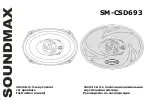
DM 605 S2
F l o o r-standing loudspeaker system
Product Summary
●
The DM605 S2 is unique answer to the problem of a system that deserves deep,
controlled bass extension when there is not the physical room to incorporate a separate
subwoofer. The 130w amplifier is used to power the two bass drivers to give truly
extended bass output.
●
The mid-range and tweeter drivers are driven conventionally from the system amplifier, while
the two bass drivers are driven by the internal amplifier to give truly extended bass
performance. Bass performance is further enhanced by Flowport™ technology, which
smoothes the passage of air over both the internal and external port flares to reduce
chuffing and improve detail. A separate line level LFE input can be driven directly from the
subwoofer output on an AV processor or amplifier.
Technical highlights
Nautilus™ Tweeter: B&W's Nautilus Tweeter technology ensures that the sound
remains focused and time-sensitive and that the stereo-image is presented with
unparalleled three dimensional accuracy.
Kevlar®: B&W developed and patented the method of using Kevlar® for
loudspeaker cones to reduce unwanted standing waves. DuPont originally
created Kevlar® for use in bulletproof vests.
B&W Loudspeakers Ltd reserves the right to amend details of the specifications without notice in line with technical developments. E & OE. All trademarks acknowledged.
www.bwspeakers.com
™
D e s c r i p t i o n
Drive units
F requency re s p o n s e
3
-
way vented-box system with active
bass
1 x 25mm metal dome high-frequency
1 x 180mm woven Kevlar® cone
bass/midrange
2 x 180mm paper/Kevlar® cone bass
25Hz (adjustable) – 20kHz ± 3dB on
reference axis
S e n s i t i v i t y
Nominal impedance
Power handling
D i m e n s i o n s
F i n i s h e s
91dB spl (2.83V, 1m)
8
Ω
(min 3
Ω
)
25W - 200W into 8 ohm on unclipped
programme
Height: 996mm Width: 236mm
Depth: 446mm
Cabinet: Black Ash Vinyl
Grilles: Black cloth
Flowport™: Golf ball aerodynamics theory points the way towards lower
distortion reflex ports. Dimples improve the way the air flows over the surface of
any object. In the case of reflex ports, they offer a significant improvement over
simply flaring the port ends in reducing air flow turbulence at each end of the
port; so you get less chuffing noise and less compression at high sound levels.



















